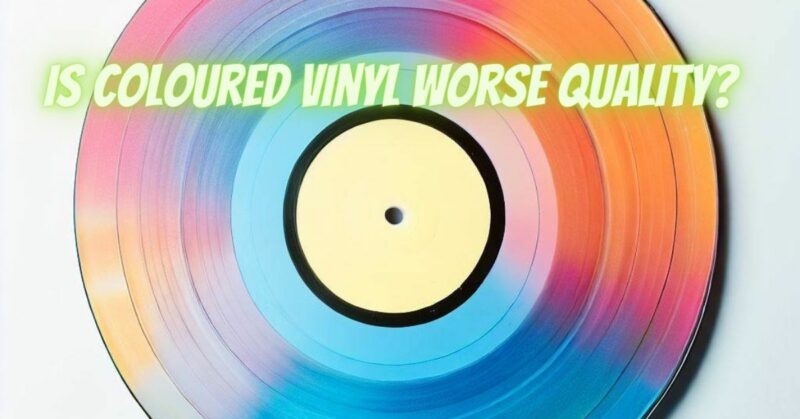Vinyl records have experienced a remarkable resurgence in popularity, attracting music enthusiasts and collectors alike. While traditional black vinyl records have been the norm for decades, colored vinyl records have become increasingly popular due to their unique aesthetics. However, a long-standing debate revolves around whether colored vinyl has inferior sound quality compared to its black counterparts. In this comprehensive article, we will delve into this debate to uncover the truth about the sound quality of colored vinyl records.
Understanding Vinyl Record Manufacturing
To assess the sound quality of colored vinyl, it’s essential to grasp the manufacturing process of vinyl records. Vinyl records are made from PVC (polyvinyl chloride) pellets, which are melted and formed into a disc. During this process, various additives are included to enhance the record’s properties, such as its durability and flexibility. These additives, known as “colorants,” are responsible for the coloration of the vinyl.
The Debate: Sound Quality of Colored Vinyl
The debate over the sound quality of colored vinyl primarily centers on two aspects:
1. Colorants’ Impact on Sound Quality:
Proponents of the argument that colored vinyl has inferior sound quality often contend that the colorants used in the vinyl manufacturing process can affect the record’s sonic performance. These colorants, they argue, may introduce impurities or irregularities into the vinyl material, leading to increased surface noise, reduced clarity, and potentially even decreased overall fidelity.
2. Manufacturing Process Improvements:
On the other hand, proponents of colored vinyl argue that advancements in vinyl manufacturing technology have minimized any potential negative impact on sound quality. They contend that modern manufacturing methods have become more refined and that the use of high-quality colorants is unlikely to significantly compromise the sound.
The Reality: Is There a Difference in Sound Quality?
The question of whether colored vinyl inherently produces inferior sound quality is complex and often subjective. Several factors can influence the perceived sound quality of a vinyl record:
1. Record Pressing Quality: Regardless of the vinyl’s color, the pressing quality plays a crucial role in sound reproduction. Records pressed with precision and care tend to exhibit better sound quality.
2. Record Material Quality: The quality of the base vinyl material used for both colored and black records is critical. High-quality PVC and careful manufacturing can mitigate potential sound issues.
3. Environmental Factors: Environmental conditions, such as humidity and temperature, can affect the performance of any vinyl record, regardless of color.
4. Mastering and Recording: The mastering and recording quality of the music onto the vinyl are paramount in determining the overall sound quality.
Conclusion: It’s Not Just About the Color
In the end, whether colored vinyl has inferior sound quality is not solely determined by its color but by a combination of factors. While some collectors and audiophiles may claim to perceive minor differences in sound quality between colored and black vinyl records, these differences are often subjective and dependent on the specific release, pressing, and playback equipment.
The most critical considerations for vinyl enthusiasts remain the quality of the pressing, the mastering of the music, and the condition of the record. Whether it’s colored or black, a well-pressed vinyl record, handled and maintained with care, can deliver a rich and satisfying listening experience that transcends the color of the vinyl itself. Therefore, collectors and music lovers should focus on the quality of the entire vinyl package, rather than fixating on its color, to ensure the best possible sound reproduction.


